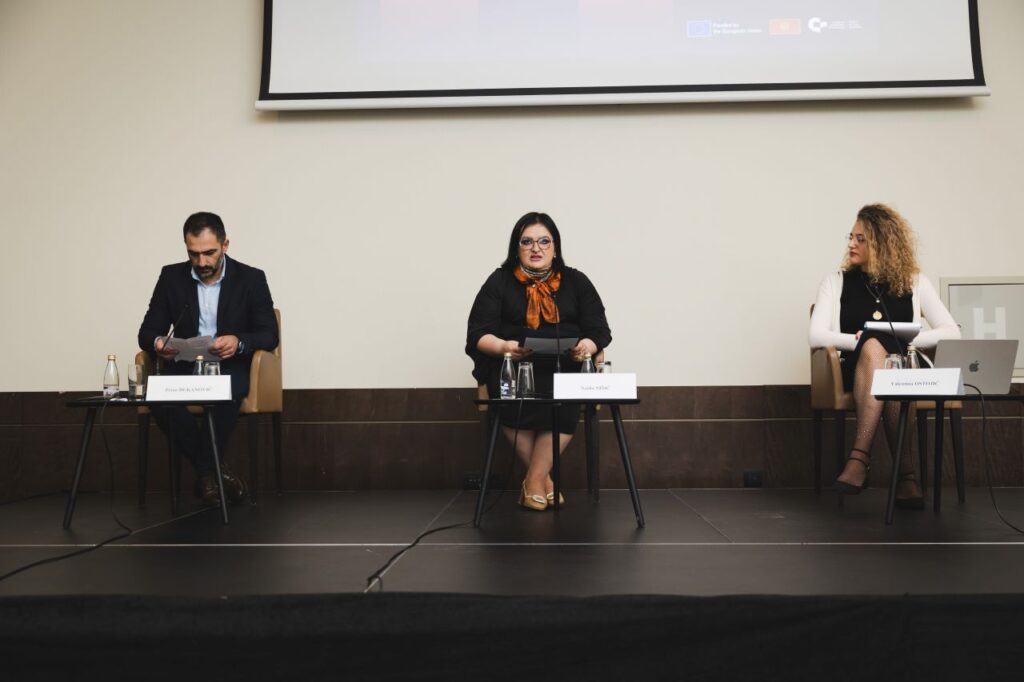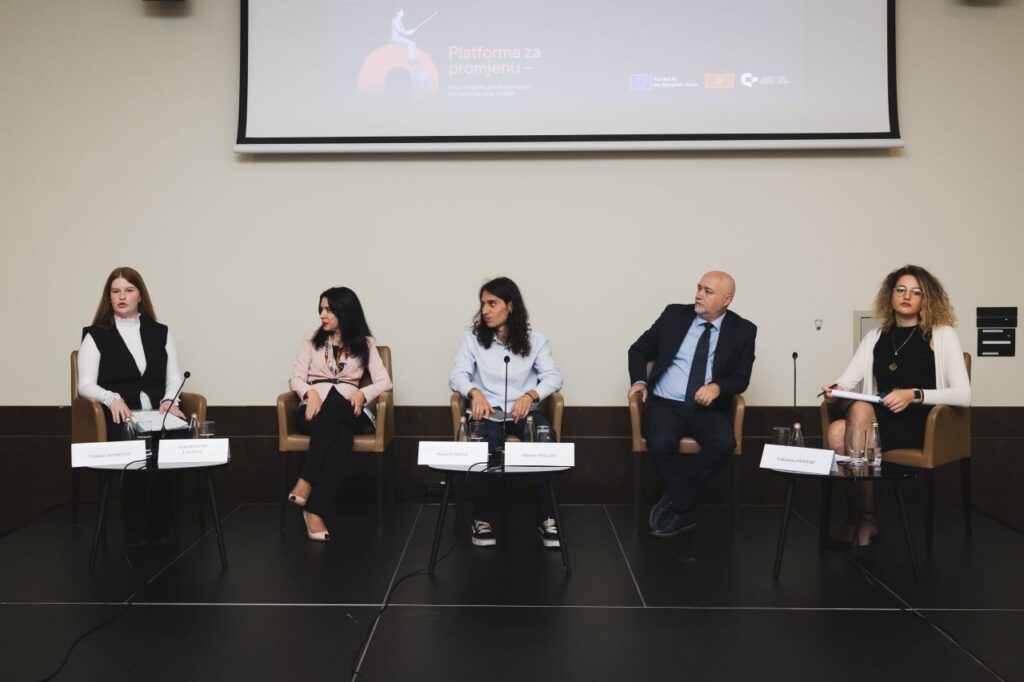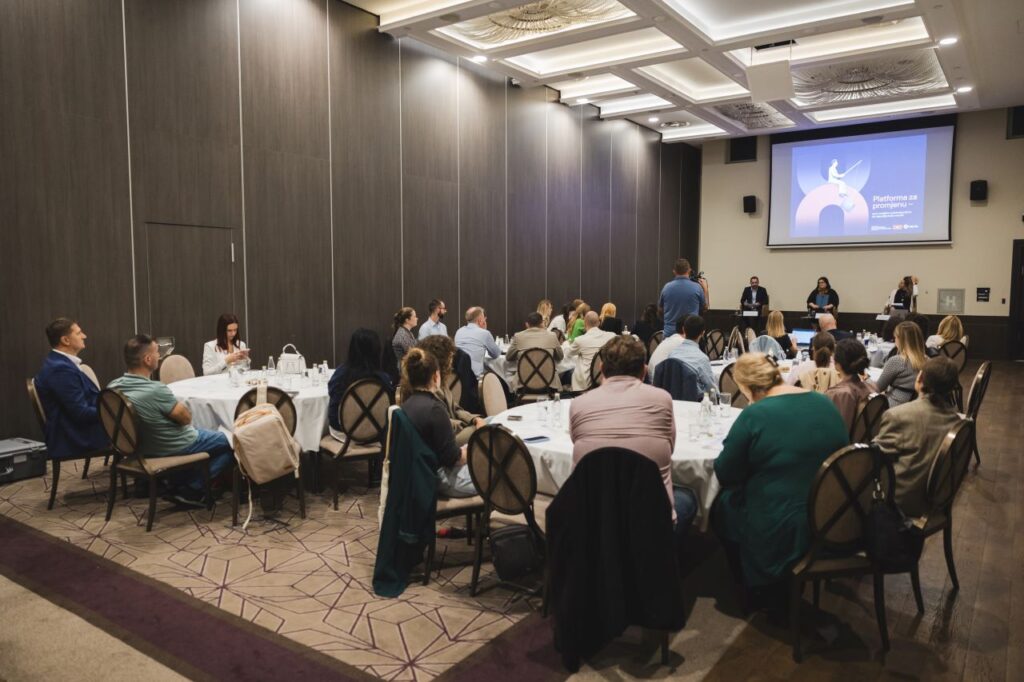Social entrepreneurship is a piece of the puzzle that can help young people become more independent and engaged, but also contribute to transforming the entire society for the better. Youth represent the present and have immense potential, but for that potential to be realized, changes in the formal education system are necessary, along with greater focus on topics such as economic policy, the green agenda, and education reform, it was stated today at the conference “Platform for Change – Through Social Entrepreneurship to Youth Employment” organized by the Centre for Civic Education (CCE).
“Montenegro is on the verge of becoming a full EU member, which we consider a collective success of the dedicated work of the Government, civil sector, social partners, and private sector. The ‘Youth Job Link’ project is one segment of this collective effort and an example of good cooperation across all sectors of the community,” said Naida Nišić, Minister of Labour, Employment, and Social Dialogue in the Government of Montenegro, opening the conference. She highlighted the importance of social entrepreneurship, and the need to prepare young people, as a vulnerable category, for the labor market. “Financial support for projects promoting social entrepreneurship is just one part of a comprehensive strategy aimed at greater integration of young people into the labour market. By doing so, we directly assist those at the highest risk, while also creating an inclusive society,” she said. “Through the work of the Youth Guarantee Working Group, we will strive to involve as many young people as possible, as well as NGOs that deal with their rights, so that together we can create an environment where every young person will receive the necessary support,” Nišić added.
Petar Đukanović, Programme Director of CCE, highlighted the severity of youth unemployment in Montenegro, reminding that the youth unemployment rate was around 20% in 2023. He pointed to several causes, including an outdated education system, a lack of opportunities for gaining practical experience, weak connections between employers and young people, and limited opportunities for starting their own businesses. “Young people face unemployment, precarious and low-paid jobs, which hinders their professional development and transition to adulthood, exposes them to the risk of exploitation, and undermines their professional stability,” explained Đukanović. “The development of social entrepreneurship can create jobs in areas often neglected by traditional employers, such as social services, environmental protection, and the inclusion of marginalized groups. These business models would allow young people to gain practical skills and experience, often through innovative projects, while simultaneously addressing specific social challenges. In this way, young people not only find employment but also become active agents of social change,” Đukanović stated.
The main findings of the study “Social Enterprises: Potential for Improving Socio-Economic Opportunities in Montenegro” were presented by Valentina Ostojić, programme associate at CCE. She reflected on various definitions of social enterprises in different countries, their development in the EU, and business models, with examples of best practices. “In Montenegro, we do not even have a Law on Social Entrepreneurship, which would facilitate the establishment and operation of these enterprises, as they currently operate in various formats. Additionally, we lack relevant statistics, and comprehensive research and mapping of social enterprises and other entities operating under social and circular economy principles are not conducted,” explained Ostojić. Some of the study’s recommendations include the introduction of annual statistical monitoring and Montenegro’s accession to the European Social Enterprise Monitor. Ostojić also emphasized the need for financial and technical support for social enterprises to facilitate their work and market access.
This was followed by a panel discussion titled “From Idea to Practice – How Do Young People Create Social Impact?” with speakers including Zoja Bojanić Lalović, MP and member of the Committee on Education, Science, Culture and Sports in the Parliament of Montenegro, Mladen Perazić, Director of the Education and Quality Sector at the Chamber of Commerce, Vladana Mitrović, participant of the YouthJobLink programme, and Dušan Pajović, activist and writer.
“Throughout my career, I have focused on the needs of young people. I see that the environment being created for the development of youth in the political sphere increasingly serves personal interests, rather than improving quality of life,” said Zoja Bojanić Lalović, commenting on CCE’s research findings that around 40% of young people want to leave Montenegro. “This warns us that young people do not perceive Montenegro as a country where they can realize their potential and that divisions at all levels have strengthened young people’s insecurity, leading them to seek opportunities elsewhere,” she said, also reminding that the new Law on Higher Education has been delayed for too long. “Young people understand that it is more beneficial to study abroad, and they are not waiting. Therefore, those of us making important decisions in Parliament must do better that young people can feel the positive changes and benefits faster. Youth are not just the future; they are present,” Bojanić Lalović emphasized. She also highlighted the growing problem of peer violence as a consequence of the poor environment in which young people are growing up, signaling the need for urgent action.
Vladana Mitrović shared her experience through YouthJobLink, noting that it exceeded her expectations. “I always believed that young people, although they often seem inactive, have enourmous potential. I believe that with their skills and knowledge, they can contribute to positive change. That’s why I gave my best during the training organized by CCE,” she said. Her efforts paid off, as she got the opportunity to intern at the NGO Alfa Centre, gaining valuable experience there. “Just twenty days after starting my internship, I appeared on a TV show to present the project results, which was completely new and exciting for me. Over these months, I have learned a lot – from understanding how the civil sector operates, to drafting project proposals, implementing projects, as well as numerous administrative tasks. Although I graduated from the Faculty of Law, I lacked practical experience, so it took me some time to adjust to the pace of work in NGOs, which are extremely dynamic. I am very grateful for the opportunity and support provided by CCE and Alfa Centre,” said Vladana.
“In Montenegro, we have three ways of gaining practical experience – practical training during schooling, professional practice after completing education, and the dual education system,” said Mladen Perazić, emphasizing that progress has been made in this area as young people gain practical experience, and employers hire trained staff. “The economy is not sufficiently involved in the creation of study programmes. We need a radical change in the Law on Higher Education, as well as the practices in its creation,” he stated, adding that, as a member of the working group, he proposed that one of the goals of the Higher Education Law should be the acquisition of knowledge and skills for the labor market, but that proposal did not receive support. “There is a belief that students should be educated for science, which is often disconnected from the real needs of the economy,” Perazić explained. “The formal education system is slow to adapt to new realities and labor market needs. The key lies in greater flexibility, faster changes, and a stronger focus on adult education and acquiring qualifications that increase employability,” he concluded.
Dušan Pajović emphasized that today both politics and activism are viewed through the lens of careerism rather than social change. “Young people are no exception to this, as they already look at how to jump into parliament with a briefcase straight from university,” he said, explaining that the blame should be analyzed from multiple perspectives, as these young people were also raised in a certain unfavorable context. “In Montenegro, we are divided into two infamous streams, but when identity issues are set aside, there is an empty space for action within narratives that lack substantive content, such as economic policy, the green agenda, and education reform. We need to decolonize our imagination and aim for alternative models of organizing society because, to me, social entrepreneurship seems like an oxymoron. Companies that chase profit put social and environmental concerns in the background. That’s why we need to introduce a social safety net in the form of a universal basic income and truly democratize society – through citizen assemblies and the cooperative work model, based on one employee – one section,” said Pajović.
The conference gathered representatives of institutions, political parties, private companies, and civil society organizations working on youth employment and career development. It was the final part of the project YouthJobLink – linking youth and social enterprises, supported by the European Union through the Directorate for Financing and Contracting EU Assistance Funds (CFCU) of the Ministry of Finance.
Maja Marinović, programme associate



